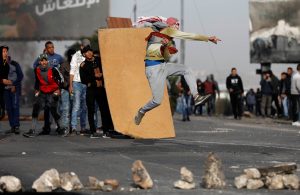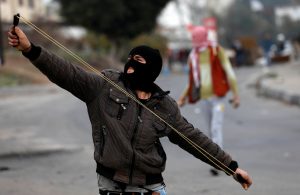
By Stephen Farrell
JERUSALEM (Reuters) – The United States opens its new embassy in Jerusalem on May 14, a move that has delighted Israel and infuriated Palestinians.
On Monday, road signs directing traffic there went up around the neighborhood where it will be situated, and next week’s opening ceremony is timed to coincide with Israel’s 70th anniversary.
The initiative was driven by President Donald Trump, after he broke last year with decades of U.S. policy by recognizing Jerusalem as the capital of Israel.
Trump said his administration has a peace proposal in the works, and recognizing Jerusalem as the capital of America’s closest ally had “taken Jerusalem, the toughest part of the negotiation, off the table.”
Israel’s prime minister, Benjamin Netanyahu, celebrated Trump’s decision, but the move upset the Arab world and Western allies.
Palestinian President Mahmoud Abbas called it a “slap in the face” and said Washington could no longer be regarded as an honest broker in any peace talks with Israel.
Initially, a small interim embassy will operate from the building in southern Jerusalem that now houses U.S. consular operations, while a secure site is found to move the rest of the embassy operations from Tel Aviv.
WHY DID TRUMP RECOGNIZE JERUSALEM AS ISRAEL’S CAPITAL, AND ANNOUNCE THE EMBASSY WILL BE MOVED THERE?
There has long been pressure from pro-Israel politicians in Washington to move the embassy to Jerusalem, and Trump made it a signature promise of his 2016 election campaign.
The decision was popular with many conservative and evangelical Christians who voted for Trump and Vice President Mike Pence, many of whom support political recognition of Israel’s claim to the city.
Trump acted under a 1995 law that requires the United States to move its embassy to Jerusalem, but to which other presidents since then – Bill Clinton, George W. Bush and Barack Obama – consistently signed waivers.
WHY DOES JERUSALEM PLAY SUCH AN IMPORTANT ROLE IN THE MIDDLE EAST CONFLICT?
Religion, politics and history.
Jerusalem has been fought over for millennia by its inhabitants, and by regional powers and invaders.
It is sacred to Judaism, Christianity and Islam, and each religion has sites of great significance there.
Israel’s government regards Jerusalem as the eternal and indivisible capital of the country, although that is not recognized internationally. Palestinians feel equally strongly, saying that East Jerusalem must be the capital of a future Palestinian state.
The city even has different names. Jews call it Jerusalem, or Yerushalayim, and Arabs call it Al-Quds, which means “The Holy”.
But the city’s significance goes further.
At the heart of the Old City is the hill known to Jews across the world as Har ha-Bayit, or Temple Mount, and to Muslims internationally as al-Haram al-Sharif, or The Noble Sanctuary. It was home to the Jewish temples of antiquity but all that remains of them above ground is a restraining wall for the foundations built by Herod the Great. Known as the Western Wall, this is a sacred place of prayer for Jews.
Within yards of the wall, and overlooking it, are two Muslim holy places, the Dome of the Rock and Al-Aqsa Mosque, which was built in the 8th century. Muslims regard the site as the third holiest in Islam, after Mecca and Medina.
The city is also an important pilgrimage site for Christians, who revere it as the place where they believe that Jesus Christ preached, died and was resurrected.
WHAT IS THE CITY’S MODERN HISTORY AND STATUS?
In 1947, the United Nations General Assembly decided that the then British-ruled Palestine should be partitioned into an Arab state and a Jewish state. But it recognized that Jerusalem had special status and proposed international rule for the city, along with nearby Bethlehem, as a ‘corpus separatum’ to be administered by the United Nations.
That never happened. When British rule ended in 1948, Jordanian forces occupied the Old City and Arab East Jerusalem. Israel captured East Jerusalem from Jordan in the 1967 Middle East war and annexed it.
In 1980 the Israeli parliament passed a law declaring the “complete and united” city of Jerusalem to be the capital of Israel. But the United Nations regards East Jerusalem as occupied, and the city’s status as disputed until resolved by negotiations between Israel and the Palestinians.
DOES ANY OTHER COUNTRY HAVE AN EMBASSY IN JERUSALEM?
In March Guatemala’s president, Jimmy Morales, said that his country will move its embassy from Tel Aviv to Jerusalem on May 16, two days after the U.S. move.
Netanyahu said in April that “at least half a dozen” countries were now “seriously discussing” following the U.S. lead, but he did not identify them.
In December, 128 countries voted in a non-binding U.N. General Assembly resolution calling on the United States to drop its recognition of Jerusalem as Israel’s capital. Nine voted against, 35 abstained and 21 did not cast a vote.
WHAT IS LIKELY TO HAPPEN NEXT? HAS JERUSALEM BEEN A FLASHPOINT BEFORE?
Since Trump’s announcement there have been Palestinian protests and wider political tensions.
Arab leaders across the Middle East have warned the move could lead to turmoil and hamper U.S. efforts to restart long-stalled Israeli-Palestinian peace talks.
More than 40 Palestinians have been killed by Israeli troops in Gaza during a six-week border protest due to culminate on May 15, the day after the U.S. Embassy move and when Palestinians traditionally lament homes and land lost with Israel’s creation.
Although the clashes have not been on the scale of the Palestinian intifadas of 1987-1993 and 2000-2005, violence has erupted before over matters of sovereignty and religion.
In 1969 an Australian Messianic Christian tried to burn down Al-Aqsa Mosque. He failed but caused damage, and prompted fury across the Arab world.
In 2000, the Israeli politician Ariel Sharon, then opposition leader, led a group of Israeli lawmakers onto the Temple Mount/al-Haram al-Sharif complex. A Palestinian protest escalated into the second intifada.
Deadly confrontations also took place in July after Israel installed metal detectors at the complex’s entrance after Arab-Israeli gunmen killed two Israeli policemen there.
(Reporting by Stephen Farrell; editing by John Stonestreet)







